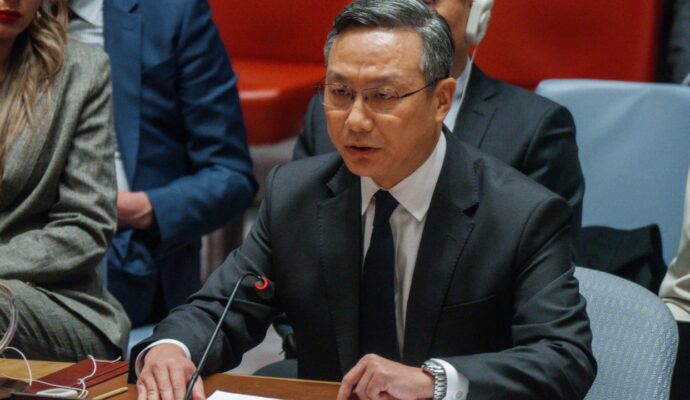Though that proposal was included in a competition bill that passed the House in February last year, it also failed to become law.
On March 29, Democratic representatives Rick Larsen of Washington, Don Beyer of Virginia and Judy Chu of California reintroduced the Restoring Fulbright Exchanges bill.
However, amid a constant spectre of congressional hearings about threats emanating from China, supporters of the programme face an uphill battle. And even if they gain traction, Beijing’s antipathy towards Western influences raises questions as to whether it would welcome a resumption.
Under the Nationalist government in 1947, China was the first country to sign a Fulbright agreement with the US, though the programme was paused after the Communist Party came into power in 1949. Since restoring operations after the two countries normalised relations in 1979, the US sent more than 3,500 Americans to China under the programme and received more than 1,500 Chinese in the US.
Proponents describe its impact as profound.
“We have many examples of US Fulbright fellows whose research topics later led to them briefing government officials, testifying before Congress, and doing groundbreaking journalism,” said O’Connor, a Fulbright grantee whose exchange took her to Yunnan province from 2012 to 2013.
The Fulbright China programme counts among its alumni Kevin Nealer, a former member of president Barack Obama’s Intelligence Advisory Board; Scott Kennedy, senior adviser in Chinese business and economics at the Centre for Strategic and International Studies; John Pomfret, The Washington Post’s former Beijing bureau chief; and legions of academics.
Fulbright participants from the US spent their exchanges all across China before the programme’s cancellation. Photo: Xinhua
Resuming the mainland China and Hong Kong programmes – the only ones in Fulbright history to be cancelled by a president – has been widely recommended by various reputable bodies, both to improve relations and American national security.
The Brookings Institution, a Washington think tank, included their reinstatement – as well as the resumption of the Peace Corps China programme, also cancelled in 2020 – in its list of recommendations to the incoming Biden administration.
The call has been repeated in multiple forums after the new Congress began in January, including at a February hearing convened by the US-China Economic and Security Review Commission, a congressional advisory panel.
O’Connor, a constituent of Beyer’s district, said her group wanted to heighten attention on the Fulbright ahead of a potential visit to the US by Chinese President Xi Jinping this year and the coming American presidential election in 2024.
Among those backing the latest push is Laurel Schwartz, a former school principal in Beijing who relocated to the US last year after spending most of the coronavirus pandemic in China.
Though not a Fulbright alumna herself, she wanted to do something “tangible and achievable” to help address information gaps and tensions she witnessed in both countries.
“I was in Beijing when there were very few Americans there other than diplomats, and I saw there, as well as here in the US, a growing sense of fear and ignorance of the other on both sides,” Schwartz said.
Schwartz said it was “eerie” to hear Chinese friends suggest that then-House speaker Nancy Pelosi’s plane be shot down when it flew to Taiwan last August, noting the comments mirrored the hostile rhetoric towards China she now hears in the US.
But because she lived in China, Schwartz added, she was able to directly explain the American perspective to her friends and help reduce misperceptions.
“They reached out to me, and they were able to reach out because they knew me,” she said. “I was there. I was their only way of being beyond the ‘Great Firewall’.”
Chinese President Xi Jinping (left) and US President Joe Biden meet on the sidelines of the G20 summit in Indonesia on November 14, 2022. Photo: AFP
In the first months of the 118th Congress, US-China relations have soured after observers noted signs of warming relations late last year following Xi and Biden’s meeting in Bali.
Notably, the US postponed a February trip to Beijing by Secretary of State Antony Blinken due to a Chinese surveillance balloon discovered over American skies. The Chinese have been stalling rescheduling efforts, according to the Financial Times.
Fulbright proponents expressed concern over the low number of Americans in China.
Several long-standing foreign study schemes on the mainland, like Harvard University’s summer Chinese language and culture programme, have shifted to Taiwan in recent years.
Schwartz and O’Connor viewed resuming Fulbright as “low-hanging fruit”, saying it is not costly and easily reversible by executive action and that the US State Department, which oversees the overall programme, already has the infrastructure to restart it.
In 2016, the US provided US$5.5 million to the Fulbright China programme, according to the State Department. China contributed about US$1.4 million.
But programme advocates would need to convince the White House that a “credible constituency” exists, according to Dennis Wilder, a research fellow at the Initiative for US-China Dialogue on Global Issues at Georgetown University.
There are organisations in the Biden administration, particularly in intelligence and law enforcement, “who are opposing restoring the Fulbright on national security grounds”, Wilder said, while noting these concerns were not necessarily shared by the White House.
Neither the Trump nor Biden administration spelled out what the concerns with the programme were.
US deputy secretary of state Wendy Sherman has praised the Fulbright programme for boosting Sino-American understanding. Photo: EPA-EFE
At a Brookings event in February, deputy secretary of state Wendy Sherman called Fulbright “a fantastic programme, really important to both [the US and China]” and that “it’s important for [both sides] to understand each other better”.
The American public has appeared supportive of such exchanges, too. A Pew survey released earlier this month showed that most Americans believed the US and China could cooperate on student exchanges.
O’Connor said securing backing from Republicans in particular had been difficult given current sentiment towards China.
“Behind the scenes, the Fulbright programme continues to receive bipartisan support,” she added. “However, there is a politically fuelled hesitancy to openly speak about increasing cross-cultural understanding between the US and China, on both sides of the aisle.”
Meanwhile, Florida senators Marco Rubio and Rick Scott, both Republicans, lauded the Peace Corps’ decision to leave China, after sending volunteer English teachers to rural areas of the country since 1993. Scott described the programme as “[propping] up our adversaries with US tax dollars”.
In response, a group of returned volunteers started a non-profit, the Peace Corps China Association, in January to promote exchange opportunities and bilateral understanding.
US Senator Rick Scott, Republican of Florida, has been a vocal critic of cultural exchanges with China. Photo: Reuters
Opponents of restoring programmes like Fulbright have raised concerns that sending Americans to China would put them at risk of detention by mainland authorities and reward the country’s human rights abuses.
Fulbright alumni counter they were unaware of any public targeting of programme fellows during Xi’s presidency and that restricting exchanges did not address these concerns, instead undermining US national security by limiting understanding of issues within China.
Wilder, who held posts at the National Security Council and CIA, said people who had spent extensive time in the country had a “fingertip feel for China – that special quality of really understanding how people work and behave in China”.
While other programmes existed to facilitate exchanges, Fulbright carried “special meaning” given its long history as a flagship US government programme for exchange, Wilder added.
“Bringing it back would be one of those signals of trying to get the US-China relationship stabilised, so it has symbolic importance”.
But David Lampton, professor emeritus at the Johns Hopkins School of Advanced International Studies and a former Fulbright fellow in Hong Kong, said it was far from certain that the Chinese wanted the programme back.
“One of the first things Xi did was issue a central document called ‘Document No 9’ … to warn against Western ideological subversion, tightening up on Western-style curricula on law, human rights, media freedom,” Lampton said of the Chinese leader’s early days as president.
“Xi was already headed in a direction that was sceptical of such activity, and so Trump ended a programme that Xi didn’t have to end,” he added.
It would not be the first time for China to reject Fulbright. In August 1989, due to fallout from the Tiananmen Square crackdown, China suspended its participation for a year.
The Chinese embassy in Washington did not respond to a request for comment about the programme.
For people like Schwartz, who volunteers her time to advocacy, Fulbright’s fame and symbolism give it unique value.
“While it’s not necessarily a large programme, it’s the marquee person-to-person exchange that is run by the US government. It’s what folks around the world know and respect and has a symbolic value that the other programmes simply cannot match.”
It also offers a “tangible way for us to ‘walk the talk’”, she said, to show we “value academic freedom” and “are separating the Chinese people from the [Communist Party]”.


